英语成语故事【三篇】欣赏(一年级阅读用).doc
成语故事大全英文版
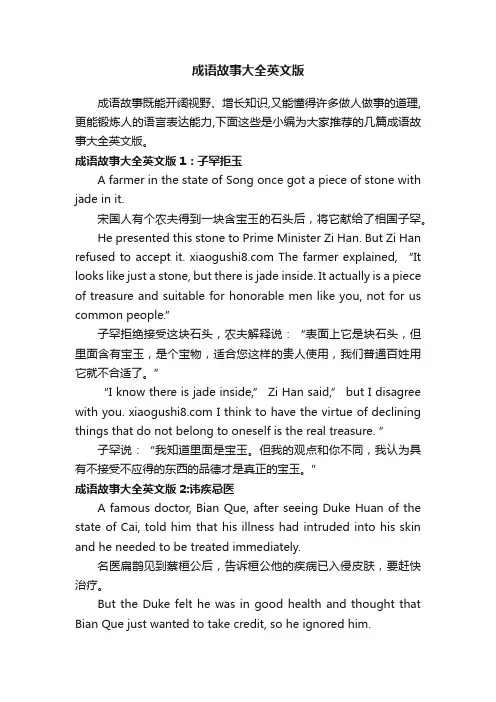
成语故事大全英文版成语故事既能开阔视野、增长知识,又能懂得许多做人做事的道理,更能锻炼人的语言表达能力,下面这些是小编为大家推荐的几篇成语故事大全英文版。
成语故事大全英文版1:子罕拒玉A farmer in the state of Song once got a piece of stone with jade in it.宋国人有个农夫得到一块含宝玉的石头后,将它献给了相国子罕。
He presented this stone to Prime Minister Zi Han. But Zi Han refused to accept it. The farmer explained, “It looks like just a stone, but there is jade inside. It actually is a piece of treasure and suitable for honorable men like you, not for us common people.”子罕拒绝接受这块石头,农夫解释说:“表面上它是块石头,但里面含有宝玉,是个宝物,适合您这样的贵人使用,我们普通百姓用它就不合适了。
”“I know there is jade inside,” Zi Han said,” but I disagree with you. I think to have the virtue of declining things that do not belong to oneself is the real treasure. ”子罕说:“我知道里面是宝玉。
但我的观点和你不同,我认为具有不接受不应得的东西的品德才是真正的宝玉。
”成语故事大全英文版2:讳疾忌医A famous doctor, Bian Que, after seeing Duke Huan of the state of Cai, told him that his illness had intruded into his skin and he needed to be treated immediately.名医扁鹊见到蔡桓公后,告诉桓公他的疾病已入侵皮肤,要赶快治疗。
英文成语故事(通用8篇)
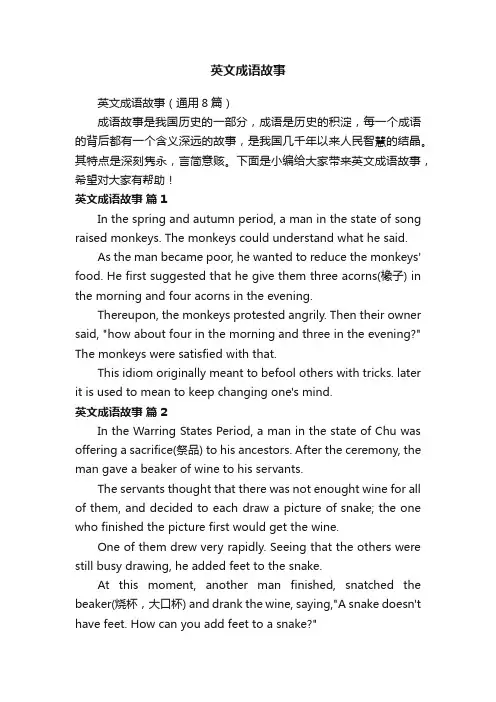
英文成语故事英文成语故事(通用8篇)成语故事是我国历史的一部分,成语是历史的积淀,每一个成语的背后都有一个含义深远的故事,是我国几千年以来人民智慧的结晶。
其特点是深刻隽永,言简意赅。
下面是小编给大家带来英文成语故事,希望对大家有帮助!英文成语故事篇1In the spring and autumn period, a man in the state of song raised monkeys. The monkeys could understand what he said.As the man became poor, he wanted to reduce the monkeys' food. He first suggested that he give them three acorns(橡子) in the morning and four acorns in the evening.Thereupon, the monkeys protested angrily. Then their owner said, "how about four in the morning and three in the evening?" The monkeys were satisfied with that.This idiom originally meant to befool others with tricks. later it is used to mean to keep changing one's mind.英文成语故事篇2In the Warring States Period, a man in the state of Chu was offering a sacrifice(祭品) to his ancestors. After the ceremony, the man gave a beaker of wine to his servants.The servants thought that there was not enought wine for all of them, and decided to each draw a picture of snake; the one who finished the picture first would get the wine.One of them drew very rapidly. Seeing that the others were still busy drawing, he added feet to the snake.At this moment, another man finished, snatched the beaker(烧杯,大口杯) and drank the wine, saying,"A snake doesn't have feet. How can you add feet to a snake?"This idiom refers to ruining a venture by doing unnecessary and surplus things.英文成语故事篇3In the Spring and Autumn Period, a farmer in the State of Song was one day working in the fields when he saw a rabbit bump into a tree stump(树桩) accidentally and break its neck.The farmer took the rabbit home, and cooked himself a delicious meal.That night he thought, 'I needn't work so hard. All I have to do is wait for a rabbit each day by the stump.'So from then on he gave up farming, and simply sat by the stump waiting for rabbits to come and run into it.This idiom satirizes(讽刺,挖苦) those who just wait for a stroke of luck, rather than making efforts to obtain what they need.英文成语故事篇4Near China's northern borders lived a man well versed in the practices of Taoism. His horse, for no reason at all, got into the territory of the northern tribes. Everyone commiserated with him."Perhaps this will soon turn out to be a blessing," said his father.After a few months, his animal came back, leading a fine horse from the north. Everyone congratulated him."Perhaps this will soon turn out to be a cause of misfortune," said his father.Since he was well-off and kept good horses his son became fond of riding and eventually broke his thigh bone falling from a horse. Everyone commiserated with him."Perhaps this will soon turn out to be a blessing," said his father.One year later, the northern tribes started a big invasion of the border regions. All able-bodied young men took up arms and fought against the invaders, and as a result, around the border nine out of ten men died. This man's son did not join in the fighting because he was crippled and so both the boy and his father survived.战国时期,靠近北部边城,住着一个老人,名叫塞翁。
英语成语故事精选及翻译五篇
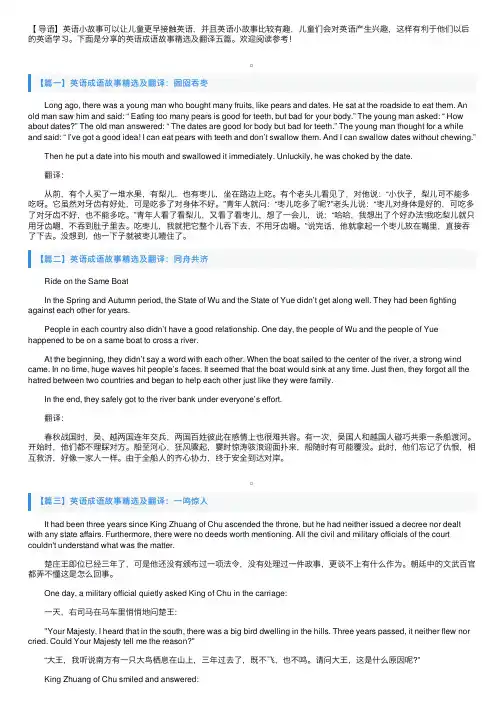
【导语】英语⼩故事可以让⼉童更早接触英语,并且英语⼩故事⽐较有趣,⼉童们会对英语产⽣兴趣,这样有利于他们以后的英语学习。
下⾯是分享的英语成语故事精选及翻译五篇。
欢迎阅读参考!【篇⼀】英语成语故事精选及翻译:囫囵吞枣 Long ago, there was a young man who bought many fruits, like pears and dates. He sat at the roadside to eat them. An old man saw him and said: “ Eating too many pears is good for teeth, but bad for your body.” The young man asked: “ How about dates?” The old man answered: “ The dates are good for body but bad for teeth.” The young man thought for a while and said: “ I’ve got a good idea! I can eat pears with teeth and don’t swallow them. And I can swallow dates without chewing.” Then he put a date into his mouth and swallowed it immediately. Unluckily, he was choked by the date. 翻译: 从前,有个⼈买了⼀堆⽔果,有梨⼉,也有枣⼉,坐在路边上吃。
有个⽼头⼉看见了,对他说:“⼩伙⼦,梨⼉可不能多吃呀。
它虽然对⽛齿有好处,可是吃多了对⾝体不好。
”青年⼈就问:“枣⼉吃多了呢?”⽼头⼉说:“枣⼉对⾝体是好的,可吃多了对⽛齿不好,也不能多吃。
简短的英语成语故事三篇
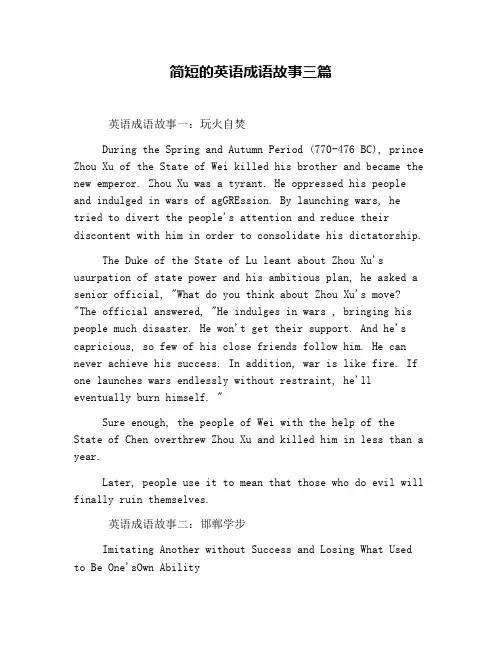
简短的英语成语故事三篇英语成语故事一:玩火自焚During the Spring and Autumn Period (770-476 BC), prince Zhou Xu of the State of Wei killed his brother and became the new emperor. Zhou Xu was a tyrant. He oppressed his people and indulged in wars of agGREssion. By launching wars, he tried to divert the people's attention and reduce their discontent with him in order to consolidate his dictatorship.The Duke of the State of Lu leant about Zhou Xu's usurpation of state power and his ambitious plan, he asked a senior official, "What do you think about Zhou Xu's move? "The official answered, "He indulges in wars , bringing his people much disaster. He won't get their support. And he's capricious, so few of his close friends follow him. He can never achieve his success. In addition, war is like fire. If one launches wars endlessly without restraint, he'll eventually burn himself. "Sure enough, the people of Wei with the help of the State of Chen overthrew Zhou Xu and killed him in less than a year.Later, people use it to mean that those who do evil will finally ruin themselves.英语成语故事二:邯郸学步Imitating Another without Success and Losing What Used to Be One'sOwn AbilityTradition has it that more than 2,oooyears ago,there lived a young man in the Shouling area of the State of Yan.As his name is not known ,we just call him Shouling young manfor convenience's sake.self confident He was at a loss as to how to behave all the time.His family members advised him to overcome this shortcoming,but he thought they were fond of poking their noses into his business and were unwilling to provide him with tuition fee.His relatives and neighbours sneered at him,saying that he would never be able to learnanything.Asthe days went by,he even began to doubt whether he should walk the way he did,for he felt more and more that his walking gestures were too clumsy and awkward.One day,he met some people on the road who werechattingand laughing.One of themsaid that people in Handan walked most gracefully.And thatwas just what he was most concerned about,so he hurreed towards themand wanted to make further inquiries.To his surprise,when these people saw him,they stalked off laughing.He could not picture to himself in what way their walking gestures were graceful,no matter how hard he racked his parents one day.He went to Handanwhich was far away to learn how to walk.As soon as he arrived in Handan,he was dazzled to find that everything was novel.He learned from the children there how to walk,because he thought that the children's walking gestures were lively and pleasing to the eye.He learnd fromthe old people there how to walk,because he thought the old people's walking gestures were steady .He learnd from the women there how to walk,because he thought the women' swaying walking gestures were beautiful.That being the case withhim ,in less than half a month he even forgot how to walk.As he had already used up his traveling expenses,he had to crawl back home.Thisstory come from the article"Autumn Water"in The Works of Xhuang Zi(Zhuang Zi was a famous ancient Chinese philosopher of about 300B.c.).Later the set phrase"initating another without success and losing what used to be one's own ability"is used to refer to acts of copying others mechanisally in disregard of specififc conditions.英语成语故事三:塞翁失马Near China's northern borders lived a man well versed in the practices of Taoism. His horse, for no reason at all, got into the territory of the northern tribes. Everyone commiserated with him."Perhaps this will soon turn out to be a blessing," said his father.After a few months, his animal came back, leading a fine horse from the north. Everyone congratulated him."Perhaps this will soon turn out to be a cause of misfortune," said his father.Since he was well-off and kept good horses his son became fond of riding and eventually broke his thigh bone falling from a horse. Everyone commiserated with him."Perhaps this will soon turn out to be a blessing," said his father.One year later, the northern tribes started a biginvasion of the border regions. All able-bodied young mentook up arms and fought against the invaders, and as a result, around the border nine out of ten men died. This man's sondid not join in the fighting because he was crippled and so both the boy and his father survived.。
简短的英语成语故事三篇
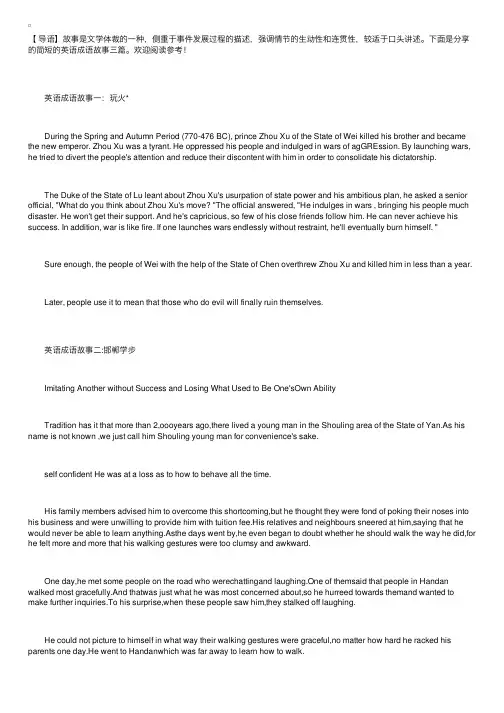
【导语】故事是⽂学体裁的⼀种,侧重于事件发展过程的描述,强调情节的⽣动性和连贯性,较适于⼝头讲述。
下⾯是分享的简短的英语成语故事三篇。
欢迎阅读参考! 英语成语故事⼀:玩⽕* During the Spring and Autumn Period (770-476 BC), prince Zhou Xu of the State of Wei killed his brother and became the new emperor. Zhou Xu was a tyrant. He oppressed his people and indulged in wars of agGREssion. By launching wars, he tried to divert the people's attention and reduce their discontent with him in order to consolidate his dictatorship. The Duke of the State of Lu leant about Zhou Xu's usurpation of state power and his ambitious plan, he asked a senior official, "What do you think about Zhou Xu's move? "The official answered, "He indulges in wars , bringing his people much disaster. He won't get their support. And he's capricious, so few of his close friends follow him. He can never achieve his success. In addition, war is like fire. If one launches wars endlessly without restraint, he'll eventually burn himself. " Sure enough, the people of Wei with the help of the State of Chen overthrew Zhou Xu and killed him in less than a year. Later, people use it to mean that those who do evil will finally ruin themselves. 英语成语故事⼆:邯郸学步 Imitating Another without Success and Losing What Used to Be One'sOwn Ability Tradition has it that more than 2,oooyears ago,there lived a young man in the Shouling area of the State of Yan.As his name is not known ,we just call him Shouling young man for convenience's sake. self confident He was at a loss as to how to behave all the time. His family members advised him to overcome this shortcoming,but he thought they were fond of poking their noses into his business and were unwilling to provide him with tuition fee.His relatives and neighbours sneered at him,saying that he would never be able to learn anything.Asthe days went by,he even began to doubt whether he should walk the way he did,for he felt more and more that his walking gestures were too clumsy and awkward. One day,he met some people on the road who werechattingand laughing.One of themsaid that people in Handan walked most gracefully.And thatwas just what he was most concerned about,so he hurreed towards themand wanted to make further inquiries.To his surprise,when these people saw him,they stalked off laughing. He could not picture to himself in what way their walking gestures were graceful,no matter how hard he racked his parents one day.He went to Handanwhich was far away to learn how to walk. As soon as he arrived in Handan,he was dazzled to find that everything was novel.He learned from the children there how to walk,because he thought that the children's walking gestures were lively and pleasing to the eye.He learnd from the old people there how to walk,because he thought the old people's walking gestures were steady .He learnd from the women there how to walk,because he thought the women' swaying walking gestures were beautiful.That being the case with him ,in less than half a month he even forgot how to walk.As he had already used up his traveling expenses,he had to crawl back home. Thisstory come from the article"Autumn Water"in The Works of Xhuang Zi(Zhuang Zi was a famous ancient Chinese philosopher of about 300B.c.).Later the set phrase"initating another without success and losing what used to be one's own ability"is used to refer to acts of copying others mechanisally in disregard of specififc conditions. 英语成语故事三:塞翁失马 Near China's northern borders lived a man well versed in the practices of Taoism. His horse, for no reason at all, got into the territory of the northern tribes. Everyone commiserated with him. "Perhaps this will soon turn out to be a blessing," said his father. After a few months, his animal came back, leading a fine horse from the north. Everyone congratulated him. "Perhaps this will soon turn out to be a cause of misfortune," said his father. Since he was well-off and kept good horses his son became fond of riding and eventually broke his thigh bone falling from a horse. Everyone commiserated with him. "Perhaps this will soon turn out to be a blessing," said his father. One year later, the northern tribes started a big invasion of the border regions. All able-bodied young men took up arms and fought against the invaders, and as a result, around the border nine out of ten men died. This man's son did not join in the fighting because he was crippled and so both the boy and his father survived.。
中英文成语故事精选三篇
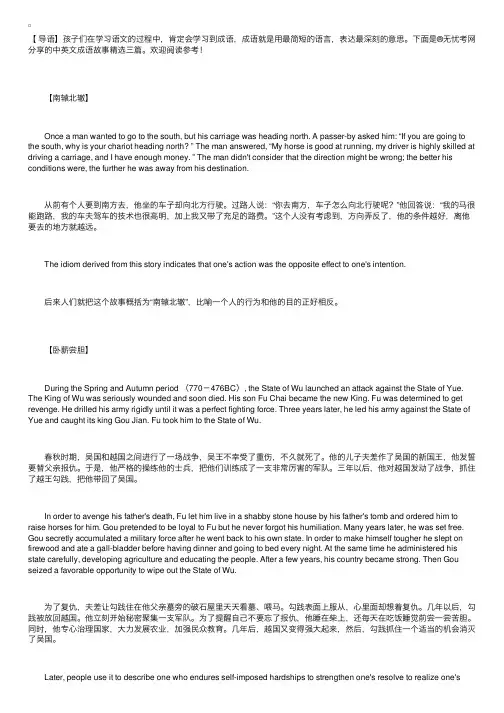
【导语】孩⼦们在学习语⽂的过程中,肯定会学习到成语,成语就是⽤最简短的语⾔,表达最深刻的意思。
下⾯是®⽆忧考⽹分享的中英⽂成语故事精选三篇。
欢迎阅读参考! 【南辕北辙】 Once a man wanted to go to the south, but his carriage was heading north. A passer-by asked him: “If you are going to the south, why is your chariot heading north? ” The man answered, “My horse is good at running, my driver is highly skilled at driving a carriage, and I have enough money. ” The man didn't consider that the direction might be wrong; the better his conditions were, the further he was away from his destination. 从前有个⼈要到南⽅去,他坐的车⼦却向北⽅⾏驶。
过路⼈说:“你去南⽅,车⼦怎么向北⾏驶呢?”他回答说:“我的马很能跑路,我的车夫驾车的技术也很⾼明,加上我⼜带了充⾜的路费。
”这个⼈没有考虑到,⽅向弄反了,他的条件越好,离他要去的地⽅就越远。
The idiom derived from this story indicates that one's action was the opposite effect to one's intention. 后来⼈们就把这个故事概括为“南辕北辙”,⽐喻⼀个⼈的⾏为和他的⽬的正好相反。
【卧薪尝胆】 During the Spring and Autumn period (770-476BC), the State of Wu launched an attack against the State of Yue. The King of Wu was seriously wounded and soon died. His son Fu Chai became the new King. Fu was determined to get revenge. He drilled his army rigidly until it was a perfect fighting force. Three years later, he led his army against the State of Yue and caught its king Gou Jian. Fu took him to the State of Wu. 春秋时期,吴国和越国之间进⾏了⼀场战争,吴王不幸受了重伤,不久就死了。
小学英语成语故事【三篇】
小学英语成语故事【三篇】【篇1】Ji Anlived at the time of Emperor Wudi of the Western Han Dynasty (206 B.C.-A.D.24). He was respected for being upright and just and for daring to speak the truth. He did not bother about amall matters in personal behaviour and in being an official. He was particular about actual effectsand ,although he did not cause a stir ,he could keep the prefecture he governed in perfect order. Because of this. the imperial court transferred him to the central government from being the perfect of the Donghai Prefecture to being a commander in charge of the appointment and dismissal of the local officals.汲黯是西汉武帝时代人,以刚直正义、敢讲真话而受人尊重。
他为人和做官都不拘小节,讲求实效。
虽然表面上不那么轰轰烈烈,却能把一个郡治理得井井有条,所以,朝廷把他从东海太守调到朝廷当主爵都尉——一种主管地方吏任免的官职。
Once,Emperor Wudi said that he would implement thepolicy of benevolence and justice of Confucianism and would do good turns to the people.Emperor Wudi Had hardly finished his remards when Ji An said that there was no need for the emperor to say so.Why should the emperor bother,Ji An said, about pretending to implement the policy of benevolence and justice since he was so greedy and avaricious within himself? This choked the emperor off. The emperor suddenly Changed his countenance and declared the meeting over. All the civilian and military officers at court were breathless with anxietyfor fear that Ji An might bring disaster upon himself because of this. After returning, Emperor Wudi said to the people around him that Ji An was a little too rude and too straightforward.有一次,汉武帝说要实行儒家的仁义之政,为老百姓办好事了。
英语成语故事
英语成语故事成语故事是中华民族智慧的结晶,是中华文化的重要载体,成语又是汉语中的精华,具有极强的表现力,下面这些是小编为大家推荐的几篇英语成语故事。
英语成语故事1:爱屋及乌There was a state called zhou (周) in the chinese history.One day, the king of zhou asked his officials for advice on deal with prisoners of war.An official said, "i once heard if you love someone, you are intended to love even the crows on the roof of his house; if you hate someone, you are intended to hate even the walls and the parapets of his. The prisoners of war were enemies fighting against us. In my opinion, we'd better kill them all."But the king didn't agree with him."I think we should treat the prisoners of war differently by differing them into those who are guilty and those who are not. The guilty ones will be sentenced to death in order to avoid future disasters." Another official put forward his suggestion.The king didn't think it was a proper way, either.Then a third one said, "Your majesty, I think all the prisoners should be set free and sent back home to work in the fields and support themselves by their own labor. Moreover, you should keep strictly the rules for reward and punishment and treat your relatives and friends impartially.The people are sure to believe in you if you administer our country by morals and laws."The king thought the official's proposal was quite reasonable so he accepted and followed it.As a result, the domestic situation soon settled down and gradually the country became more stable and stronger.The idiom is then used to mean that if you love someone,you'll love people and things relative to him as well. 英语成语故事2:洛阳纸贵In the Jin Dynasty (265-420) there was a famous writer whose name was Zuo Si who, however, was very naughty and did not like to study when he was a small kid.His father often got angry, and yet young Zuo Si was as naughty as ever and would not study hard.One day, Zuo Si's father was chatting with his friends. his friends envied him his clever and loverly son. Hearing this, Zuo si's father sighed, "Please do not mention him. My son Zuo si does not study as well as I did when I was young, although I did not study well enough myself. It appears that he is actually a good-for-nothing." So saying, he looked disappointed. All this was witnessed by young Zuo Si. He felt very sad, feeling intensely that he would not be able to have a bright future if he did not study hard. So he was determined to study assiduously from then on.Day after day and year after year, Zuo Si gradually grew up. Because of his unremitting afforts in hard study, he became an erudite scholar and wrote very excellent essays.The "Ode to the Capital of the State of Qi", which took him one year to write, showed his brilliant literary talent and laid the foundation for his becoming an outstanding writer. then he planned to write an "Ode to the Capitals of the Three Kingdoms of Wei, Shu Han and Wu" with the local conditions and customs as well as the produce of the three capitals as its content.In order to achieve the desired effect in content, structure and language, he applied himself to research work with great concentration, and was so absorbed in creative writing as toforget food and sleep. It took him ten whole years to finish the writing of "Ode to the Capitals of the Three Kingdoms of Wei, Shu Han and Wu", a literary masterpiece.The "Ode to the Capitals of the Three Kingdoms of Wei, Shu Han and Wu" was well received by the broad masses of readers after it made its appearance to the public, and people considered it as superbly written as the "Ode to the Western Capital (Changan) and to the Eastern Capital (Luoyang)" written by Ban Gu (32-92) and the "Ode to the Western Capital and to the Eastern Capital" written by Zhang Heng of the Han Dynasty (206 B.C. to A.D.220). As the art of printing had not been invented at that time, people who were fond of this "Ode" had to make handwritten copies of it themselves. As there were so many people who vied with each other in making handwritten copies, the supply of writing paper fell short of the demand in Luoyang went up greatly.This story comes from "The life of Zuo Si" in the book "Literary Field" of The History of the Jin Dynasty. Based on this story, people have coined the set phrase "the price of writing paper went up greatly", meaning the overwhelming popularity of a new work causes shortage of printing paper, to show how popular an outstanding piece of literary work is.英语成语故事3:鹏程万里A Roc's flight of ten thousand li-A bright futureIn the Chinese classic 《Chuangtze》, there is a legend like this:Once upon a time, a gigantic fish named Kun lived in the northern sea. No one knew how large it actually was. This fish could change itself into the enormous bird called Peng (roc), measuring thousands of kilometers in length. When the bird wasspreading its wings, it looked like huge clouds in the sky. It could, in one stretch, fly from the northern sea to the southern sea on the other side of the globe and soaring up to 90000 li (45000 kilometers) in the heaven.the bird can surely fly over a long distance without stop. Now people use this idiom to with others have a long career or a bright future.。
一年级学生的成语双语故事
【篇一】a drop in the bucket九牛一毛Li Ling was a great general during the time of emperor Han Wu-di (hàn wǔ dì汉武帝). He was a very good fighter,and he won every battle.西汉时代有个很有名的大将军名叫李陵,他骁勇善战,百战百赢。
One time, however, Li Ling‘s troops were so hopelessly outnumbered by the Huns that although they fought bravely,the whole army was soon taken captive.有一次,虽然李陵的军队奋勇杀敌,因为兵力不足而战败投降。
Li Ling shamefully surrendered for the moment, planning to wait for an opportunity to strike back.李陵打算暂时先忍辱投降,以便伺机等待机会反击。
But when news of the surrender reached the capital, the emperor’s jealous ministers began to degrade Li Ling in front of the emperor.但当李陵投降的消息传到首都,皇上身边嫉妒的大臣们都开始指责李陵。
What he heard made the emperor so angry that he had Li Ling‘s wife and mother put to death.皇上十分气愤,他将李陵的妻子与母亲都赐死了。
Ze-ma Chian, who had always respected Li Ling, believed that he wouldn’t surrender without a reason, and urged the emperor not to believe rumors.司马迁一直很敬重李陵,他不信李陵会无缘无故投降,便谏言皇上不要听信谣言。
【三篇】一年级学生的成语双语故事
【三篇】一年级学生的成语双语故事导读:本文【三篇】一年级学生的成语双语故事,仅供参考,如果觉得很不错,欢迎点评和分享。
【篇一】a drop in the bucket九牛一毛Li Ling was a great general during the time of emperor Han Wu-di (hàn wǔ dì汉武帝). He was a very good fighter,and he won every battle.西汉时代有个很有名的大将军名叫李陵,他骁勇善战,百战百赢。
One time,however,Li Ling‘s troops were so hopelessly outnumbered by the Huns that although they fought bravely,the whole army was soon taken captive.有一次,虽然李陵的军队奋勇杀敌,因为兵力不足而战败投降。
Li Ling shamefully surrendered for the moment,planning to wait for an opportunity to strike back.李陵打算暂时先忍辱投降,以便伺机等待机会反击。
But when news of the surrender reached the capital,the emperor’s jealous ministers began to degrade Li Ling in fro nt of the emperor.但当李陵投降的消息传到首都,皇上身边嫉妒的大臣们都开始指责李陵。
What he heard made the emperor so angry that he had Li Ling‘s wife and mother put to death.皇上十分气愤,他将李陵的妻子与母亲都赐死了。
- 1、下载文档前请自行甄别文档内容的完整性,平台不提供额外的编辑、内容补充、找答案等附加服务。
- 2、"仅部分预览"的文档,不可在线预览部分如存在完整性等问题,可反馈申请退款(可完整预览的文档不适用该条件!)。
- 3、如文档侵犯您的权益,请联系客服反馈,我们会尽快为您处理(人工客服工作时间:9:00-18:30)。
英语成语故事【三篇】欣赏(一年级阅读用)【篇一】castles in the air空中楼阁A rich man asked an architect to build a three-story house for him.有一个富人让一位建筑师为他建造一个三层楼的房子。
When the first story was finished, the rich man said to the architect:“I want only the thir d story; not the first and second stories.”当第一层建造好的时候,富人对建筑师说:“我只想要第三层楼,不要第一、第二层。
”The architect asked,“But without the first and second stories, how can I build the third story?”建筑师说:“但没有第一、第二层,何来第三层呢?”Shaking his head, he packed up his things, and left.建筑师于是就摇了摇头,收拾东西离开了。
This idiom indicates an unrealistic or impractical plan or theory.这个成语现在比喻不现实或者不可行的计划或者理论等。
英文中“空中楼阁”可以说成“castles in the air”,基本就是直译了,所以不难理解哦~英文解释是“plans or hopes that have very little chance of happening”,也就是指“发生机会微乎其微的计划或者希望”。
我们来一起看几个例句吧~She tells me she‘s planned out her whole career, but as far as I can see it’s all just castles in the air.她告诉我她已经有了整个职业计划,但是就我看来其实只是“空中楼阁”而已。
Before you start building castles in the air, just think how much all this is likely to cost.在你开始建立“空中楼阁”之前,不如先想想你需要付出多少代价。
【篇二】a chill runs down one‘s spine不寒而栗During the Han dynasty (汉朝, 206BC—220AD), there was a man whose name was Yi Zong (义纵). Because of the special kindness of the mother of the emperor, Yi Zong was made a magistrate in one county.汉武帝时,有一个人名叫义纵,因为受到太后的恩宠,做了上党郡某县令。
After taking up the official post ,he did very well in managing the official business. He was courageous and resolutein handling cases, and punished according to law anybody who violated the law, no matter whether he was a despotic gentleman who was rich and powerful or was one of the common people.上任以后,公务办得很出色,案子处理上敢作敢为,不论是有钱有势的豪绅,还是平民,只要犯了法,义纵秉公审办。
When Yi Zong was transferred to be the prefect of the Nanyang Prefecture (南阳郡), Ning Cheng (宁成), a despotic landlord who stopped at nothing in doing evil, was living there,in order to ingratiate himself with Yi Zong, Ning Cheng pretended to be very modest and courteous every time he met Yi Zong and saw him off.当义纵被调任到南阳郡做河内郡都尉,当地的恶霸宁成为了讨好义纵,所以每次遇见义纵总是假装成非常谦逊恭敬的样子。
But Yi Zong had heard of the evil conducts of Ning Cheng already and, soon after he took office in Nanyang,he made investigations. It did not take much time for him to find out Ning cheng’s crimes and had him put in prison.但是,义纵对他的恶行早有所闻,到南阳后立即展开调查,很快就查清他的罪行,把他关押起来。
Later, Emperor Wu Di (汉武帝) of the Han Dynasty appointed Yi Zong the prefect of the Dingxiang Prefecture (定襄).后来,汉武帝又任命义纵做定襄太守。
At that time, the public order in Dingxiang was very chaotic. When he took office there, there were 200 convicts in prison who had committed felonies had no implements of punishment on them.There were also more than 200 persons who offered bribes in order to absolve those serious offenders from guilt.Yi Zong treated the matter severely. He arrested all those bribers and punished the bribers and those serious offenders already in prison severely. More than 400 convicts were executed in a day.当时定襄的社会治安十分混乱。
义纵到任以后,把押在狱中的没有加开具的二百多名重犯,以及为重犯开脱罪责进行贿赂的二百多名门客亲属,一律严加追究,拘捕治罪,一天之内处死的就有四百多名。
From that day on, whenever the name of Yi Zong was mentioned,people in Dingxiang would tremble with fear --they would shiver all over though not cold.从此以后,定襄的人一听到义纵的名字就“不寒而栗”——天气不冷却浑身发抖。
英文中“不寒而栗”可以说成“a chill runs down one‘s spine”,“spine”就是“脊椎”的意思,那这个短语也就是“一股寒气从脊椎流下”的意思啦~平时看了恐怖片或是听了鬼故事后,我们常会说“身后感到一阵发凉”,这样想也就不难理解了,也就是“不寒而栗”的意思。
【篇三】Look at someone with new eyes/knock the socks off someone 刮目相看Lv Meng (lǚ méng 吕蒙) was a general of Wu during the Three Kingdoms Period (三国时代,220-280AD).三国时期(220-280),吴国有一个叫吕蒙的将军He was born in such a poor family that he did not get any chance to go to the school when he was a child.吕蒙出生在穷苦人家,小时候没有机会上学。
However, there was still less time for reading when he served in the army after he grew up.长大后他参了军,看书的时间更少了。
Once the king of Wu summoned Lv Meng and said to him,“Since you are now a general in power, you had better read some books to widen your horizon.”一次,吴国的皇帝召见吕蒙,对他说:“现在你是大将军了,应该多看看书开阔眼界。
”Lv Meng answered,“I am so busy with military affairs that I am afraid I have little time to read.”吕蒙回答道:“军中的事务这么忙,我恐怕没有时间读书。
”The King said,“Are you busier than I am? Even I often find time to read books on the art of war and gain much benefit from them. To read more about the experience left by ourancestors will make you progress.”吴国的皇帝说:“你难道比我还忙吗?我常常抽空阅读兵书,从中得到了不少好处。
多看看前人的经验之谈,你会有更大的进步。
” Lv Meng then did according to what the king said. He concentrated himself on reading history and military writings.吕蒙接受了皇帝的建议,从此开始专心阅读,看了很多历史和军事书籍。
